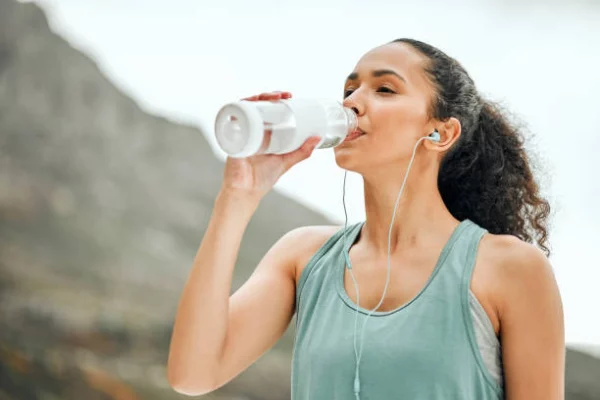Water is an essential element, making up about 60% of the human body weight. Not only does it help maintain health, but it is also widely believed to be an effective solution for weight loss. But is this really true?
Experts suggest that water can support weight loss through several natural mechanisms of the body. First, water helps enhance metabolism. A study published in The Journal of Clinical Endocrinology & Metabolism found that drinking 500ml of water can increase the metabolic rate by as much as 30% within 10 minutes of consumption.
Additionally, water plays a role in reducing appetite. According to research from the University of Virginia, drinking water before meals helps reduce calorie intake by approximately 22%, equivalent to a weight loss of 2kg over 12 weeks without changing the diet.
“Drinking a glass of water before meals not only helps you feel fuller but also aids in effective portion control,” said Professor Amanda Daley, a medical expert at Loughborough University (UK).

Research from Obesity Journal in 2022, involving 1,200 adults in a 12-week weight loss program, showed that drinking enough water daily not only helps control weight but also reduces visceral fat—a type of fat linked to the risk of cardiovascular diseases.
However, not all studies are entirely in agreement. Dr. Sarah Smith from the University of Melbourne emphasizes:
Drinking water is just a supportive measure. For sustainable weight loss, it should be combined with a balanced diet and regular exercise
How you drink water also plays a crucial role. Experts recommend that women should drink about 2.7 liters of water per day, while men need about 3.7 liters per day. Some optimal times to drink water include right after waking up to stimulate digestion or 30 minutes before each meal to control food intake.

Nowadays, many trends related to drinking water are becoming popular, from the hydrotherapy method—combining water intake with cold water baths to improve circulation—to detox water made with fruits and herbs. These methods not only support weight loss but also offer skin beauty benefits.
However, experts advise caution when adopting these methods. Dr. Emily Johnson from Harvard University shares:
“Water is an effective support tool, but it cannot replace a healthy lifestyle and a proper diet,” nutrition expert Lisa Young concludes.


HPX24h > Healthy Eating > Does Drinking Water Help with Weight Loss? The Science Behind It and How to Apply It Properly
Tagged Articles
How Often Should You Work Out Each Week for Effective Weight Loss and Muscle Gain?
Top Reads from This Category
Healthy Eating
Robert F. Kennedy Jr.: “We Are Being Poisoned Without Knowing It”
Healthy Eating
Gallbladder Protection Through Diet: Expert Guide and Practical Tips
Healthy Eating
Vegan Keto Diet: Everything You Need To Know
Healthy Eating
Why Do We Need Fiber in Our Diet?
Healthy Eating
MIND Diet – The Secret to Protecting the Brain and Preventing Cognitive Decline
Healthy Eating
Why Is Nutrition Research So Complex?
Healthy Eating
How to Create a Diet that Reduces Disease Risk While Still Being Delicious?
Discover New Topics
Parenting Tips
How to Talk to Children About Alcohol (Ages 6-8)
Space
Exploring Saturn’s Moon Phoebe: Planet-Like Features and Characteristics
Science
NSF Cuts 168 Jobs – Is the U.S. Scientific Community in Danger?
Fitness
Effective Workout Tips: The Best Full-Body Exercises for Health
Healthy Eating
What Is Nutrition? Why Is It Important For Health?
Health
Did You Know? Chronic Stress Can Prevent Your Body from Fully Recovering
Science
Blood Test: A Breakthrough in Early Detection of Alzheimer’s Disease
Health
Why You Shouldn’t Skip a Protein-Rich Breakfast
Healthy Eating
The Comprehensive Guide to the 16:8 Intermittent Fasting Diet
Healthy Eating
How Many Calories Do You Need Each Day to Maintain Optimal Health?
Parenting Tips
Fun Facts for 3-Year-Olds: Exploring the World of Animals and New Foods
Fitness
What is the Ideal Heart Rate for Running?
Parenting Tips
My Child Is Pulling Out Her Hair: How Should I Handle This?